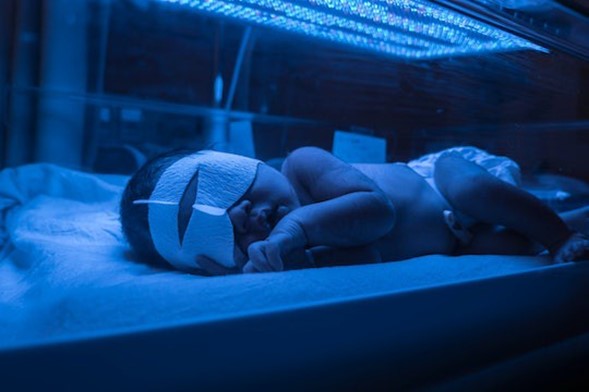A nurse is reinforcing teaching about phenylketonuria (PKU) testing with the parent of a newborn. Which of the following statements by the parent indicates a need for further teaching?
"My baby will be placed under special lights if the test is elevated.".
"My baby must take formula or breast milk before the test is done.".
"This test checks for a genetic disorder that can be corrected by diet.".
"Sometimes the test is repeated in the doctor's office at the 2-week check-up.".
The Correct Answer is A
"My baby will be placed under special lights if the test is elevated.”.
Choice A rationale:

This statement indicates a need for further teaching. Phenylketonuria (PKU) is a metabolic disorder that leads to the accumulation of phenylalanine in the body. If the PKU test is elevated, it means that the baby has high levels of phenylalanine, and immediate dietary intervention is required. The parent's statement about special lights suggests a confusion with jaundice treatment, which is not related to PKU.
Choice B rationale:
This statement is accurate. Before the PKU test is done, the baby needs to consume formula or breast milk to ensure accurate test results.
Choice C rationale:
This statement is also accurate. PKU is a genetic disorder that can be managed with a special diet low in phenylalanine. By adhering to the prescribed diet, the harmful effects of PKU can be minimized.
Choice D rationale:
This statement is accurate. It is common for the PKU test to be repeated at the 2-week check- up to confirm the initial results and ensure early detection and management of PKU if present.
Nursing Test Bank
Naxlex Comprehensive Predictor Exams
Related Questions
Correct Answer is A
Explanation
"My baby will be placed under special lights if the test is elevated.”.
Choice A rationale:

This statement indicates a need for further teaching. Phenylketonuria (PKU) is a metabolic disorder that leads to the accumulation of phenylalanine in the body. If the PKU test is elevated, it means that the baby has high levels of phenylalanine, and immediate dietary intervention is required. The parent's statement about special lights suggests a confusion with jaundice treatment, which is not related to PKU.
Choice B rationale:
This statement is accurate. Before the PKU test is done, the baby needs to consume formula or breast milk to ensure accurate test results.
Choice C rationale:
This statement is also accurate. PKU is a genetic disorder that can be managed with a special diet low in phenylalanine. By adhering to the prescribed diet, the harmful effects of PKU can be minimized.
Choice D rationale:
This statement is accurate. It is common for the PKU test to be repeated at the 2-week check- up to confirm the initial results and ensure early detection and management of PKU if present.
Correct Answer is ["A","D"]
Explanation
Choice A rationale:
Respiratory distress is a priority assessment finding that indicates a newborn may be experiencing cold stress. Cold stress can cause the baby's body to burn brown fat to generate heat, leading to increased oxygen demand and respiratory distress as a compensatory mechanism.
Choice B rationale:
Hyperglycemia is not associated with cold stress. Instead, hypoglycemia (low blood sugar) is a concern in newborns experiencing cold stress as they deplete their glucose stores to maintain body temperature.
Choice C rationale:
Metabolic alkalosis is not a priority assessment finding for cold stress. Metabolic acidosis (not listed in the options) can be associated with cold stress due to increased anaerobic metabolism, but it is not one of the provided choices.
Choice D rationale:
Hypoglycemia is a priority assessment finding associated with cold stress. As the baby's body uses glucose to produce heat from burning brown fat, it can lead to a drop in blood sugar levels, which is a significant concern in newborns.
Choice E rationale:
Metabolic acidosis is not listed among the provided choices, but it can be associated with cold stress due to the increased production of lactic acid from anaerobic metabolism when trying to generate heat.
Whether you are a student looking to ace your exams or a practicing nurse seeking to enhance your expertise , our nursing education contents will empower you with the confidence and competence to make a difference in the lives of patients and become a respected leader in the healthcare field.
Visit Naxlex, invest in your future and unlock endless possibilities with our unparalleled nursing education contents today
Report Wrong Answer on the Current Question
Do you disagree with the answer? If yes, what is your expected answer? Explain.
Kindly be descriptive with the issue you are facing.
